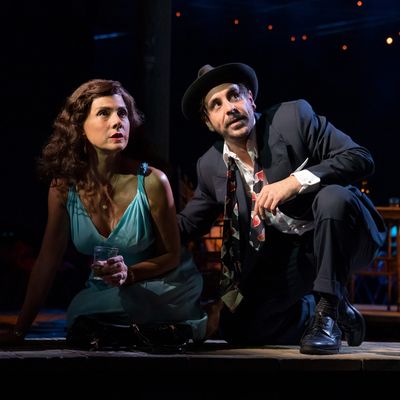
What exactly is The Rose Tattoo, anyway? Read the reviews of the original Broadway production from 1951, and it sounds as though Tennessee Williams—just off the high-impact successes of A Streetcar Named Desire and Summer and Smoke—has implausibly written a fluffy romantic comedy. Watch the trailer for the 1955 film with Anna Magnani, sold as a “fiery drama,” and you’d barely know there was a lick of humor in it (though the movie itself does have some playful moments). Most productions since then seem to have tipped one way or the other, and the Roundabout’s new one, starring Marisa Tomei, tries to split the difference, to limited success.
The gap between these two interpretations is on view in the stage design, even before anyone speaks. The setting is a small town on the Gulf Coast circa 1950, and video projections of low waves supply the backdrop, their crisp edges suggesting that the play is being cooled down and deconstructed. But right in front of them stands a field of a couple of hundred pink plastic flamingos, the kind with wire legs that are associated with aqua trailer homes. Before the action begins and after it ends, Louis Prima records play on the sound system. So are we to think big thoughts about the Endless Sea, or is this a sort of kitschy John Waters universe, or are we in the 1950s of Carbone and Scorsese? That tonal incoherence remains on view throughout the evening.
At its beginning, Serafina, a young Sicilian immigrant woman, is besotted with her truck-driver husband, with whom she has a 12-year-old daughter. She’s a lusty, earthy Italian with a heavy accent, a mid-century archetype that is, in its way, pretty similar to the Southern-gothic types that Williams loved to write. Pretty soon, she gets the news that her husband is dead, and then that he may not have been faithful to her, and she begins to disintegrate. “Three Years Later,” a projected supertitle soon tells us, and she’s now looking bedraggled, with a daughter who’s a little ashamed of her and neighbor ladies who clack their tongues, when a new man, Alvaro, begins to take an interest in her. Their flirtations constitute the main case for The Rose Tattoo as a romcom.
I should say right here that the lack of consistency undermining the show is baked into Williams’s script. Several scenes involving Serafina’s daughter are written as dead-serious melodrama, and a dramatic turn of the second act involving Alvaro’s romantic intentions was outré in its day. The drama, though, roughly alternates with scenes that are played for laughs, some of them nearly as slapstick. The director, Trip Cullman, appears to have actively played up those disparities rather than modulating them, and the whipsaw changes in mood have a way of knocking you right out of the play. Several peripheral characters, too—notably a woman who slinks in from the neighboring town named Estelle Hohengarten, played with deadpan wit by Tina Benko—are stylized in such different (albeit interesting) ways that they seem to be in another show entirely.
Tomei is at the center of virtually every scene, and she does seem to get Serafina’s tough-gal-with-heart vibe. (Which makes sense, perhaps, given that she is an Italian-American from Midwood with Sicilian roots of her own—remember how good she was as Mona Lisa?) But she, too, gets tugged in two directions, whether by director or playwright, and compensates by going big and broad with whatever she’s got. When her character is flirting with Alvaro, Tomei plays the lines just shy of sitcom-level, pausing a beat to get the laugh, delivering some almost as winking asides to the audience. When Serafina is in agony over her dead husband, she’s keening and thrashing, her emotional throttle all the way open.
None of this, mind you, is a total mess. Individual scenes are affecting, Tomei can toss off a funny line with the best of them, and you are, by the end, rooting for Serafina to find happiness again. Ella Rubin, as her daughter, Rosa, has an unexpectedly modern role to play—she’s a teenager of 15 who really wants to get with her reticent older boyfriend—and she too has stage presence to burn. Tomei looks great, and the costuming does well by everyone. (The script includes a few remarks about the degree to which Serafina has gone to seed, but you’ll just have to take that on faith.) And when the village ladies perform Italian songs that waft through breaks in the action, they’re lovely, particularly as the projected surf crashes in the background. But I found myself asking a fundamental question at the end of the evening: Why do this of all plays? Is bringing back a relatively minor, semi-interesting play at enormous scale—even one by an acknowledged master, even with an interesting actor at the center, even at a high level of technical polish—the best use of time and resources? It doesn’t have that much to say about our moment, and it’s not a play that’s dramatically revelatory about the human condition. What does that leave? I suspect that the answer lies in leaving a play like this to smaller venues, where it can perhaps be pulled or pushed in some wildly unexpected, revitalizing direction.
The Rose Tattoo is at the American Airlines Theatre through December 8.


